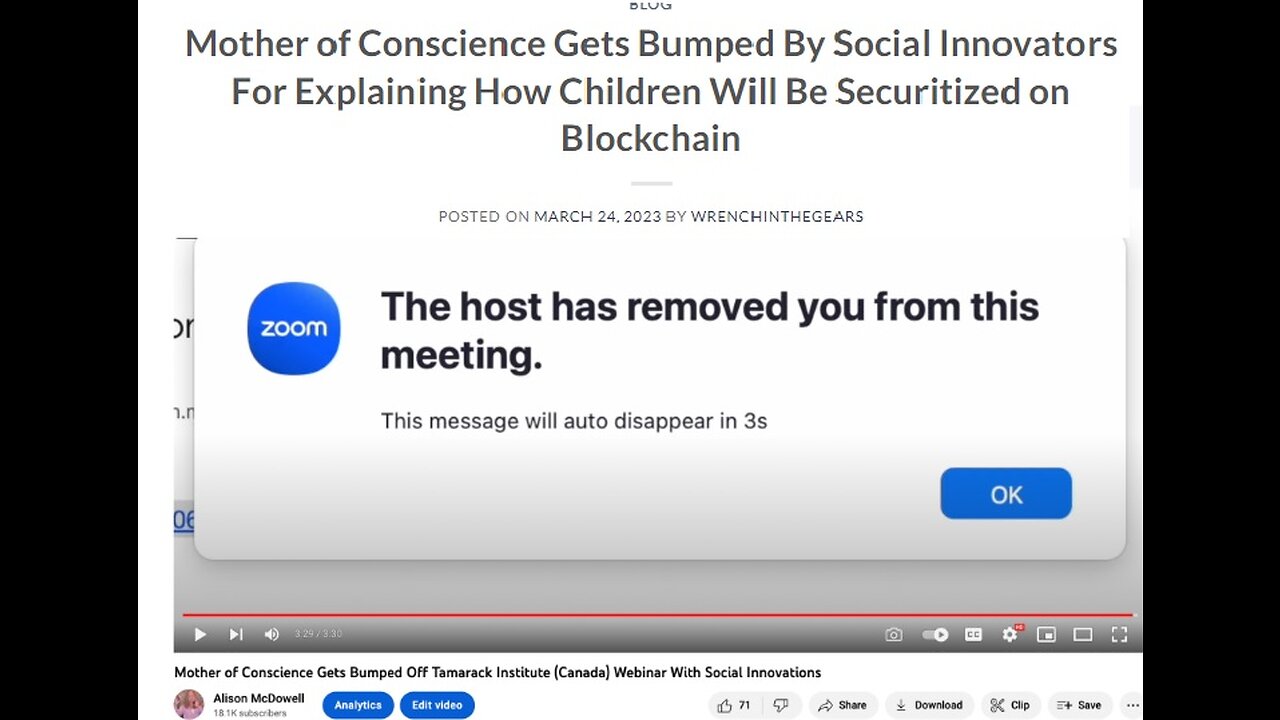Premium Only Content

Alison McDowell Gets Bumped Off Tamarack Institute (Canada) Webinar With Social Innovations
This happened to Alison McDowell today (three-a-half-minute clip below):
So much for meaningful community participation and relationship building. This demonstrates that the P3 / NGO complex is a theater of busywork to misdirect well-meaning people as Web3 sensor networks and extended reality are installed around us. It’s happening right before our eyes, but we cannot see it for what it is. Even if we could, we’re far too distracted. We’re in a struggle for consciousness and agency, navigating a digital landscape whose treachery we cannot yet fully comprehend. Tell me, what does “community” mean if the majority opts to construct a world where turning children and the most vulnerable into securitized debt is normal? Where everything we love is quantified and rated in real time by emerging technologies?
The professionals fiddle as Rome burns. They, or at least the host, couldn’t handle a mother with a conscience.
This is the introduction of a webinar hosted by Nicholas Torres of Social Innovations Journal based in the Philadelphia suburbs.
Source Link: https://archive.ph/yfSga
The webinar served as a launch event for a new volume of their journal on place-based approaches to social innovation. A majority of the co-authors were affiliated with the Canadian anti-poverty think tank, the Tamarack Institute that operates out of the University of Waterloo. There were also several participants with ties to the Salt Lake City United Way, the lead organization for the first pre-k social impact bond as well as staff from StriveTogether, the US NGO using the collective impact framework to turn children into an asset class for global investors.
I mapped out the co-authors and commenters from the chat below.
Interactive version available here.
Source Link: https://embed.kumu.io/6b7b7e7fa90e4e7b7eeac8731cfb5ce0#untitled-map?s=bm9kZS1pcEFsRHRTZA%3D%3D
Opening Remarks:
Sonja Miokovic: “So it all starts with this premise that we believe that communities drive transformational change, and this is something that Tamarack’s been doing for over twenty years now. When we were founded, we had two big goals. So, the first was to establish a learning center that would provide research and document real stories, best practices, and effective applications for community change. The second was to apply what we were learning in the field, in communities and learning to end poverty. So, these last two decades have shown us that community change really happens when individuals and networks come together with this intention to collectively tackle these problems and focus on impact.
So, I feel like the curation of this issue was a really great for us to zoom out and see how things are interconnected. This edition really focuses on our evolving understanding and our experience with social innovation, and it was a really unique opportunity for us to these examples of ingenuity across communities, across Canada but also the US and some other experience we have baked in here. So, the theme is really grounded in community innovation or place-based social innovation, and we believe this is an essential piece for tackling complex issues. Throughout our session today you’re going to hear the perspectives, we have eighteen contributing authors. So, that’s quite a lot, and it was really interesting to look at the overarching theme and see all the threads that are going through. I really invite the audience, I know it’s just gone live, but we’re going to hear from all the authors to hear their thinking, and how they’ve moved these themes forward. So, questions are always welcome.
*Remember that last part when we get to the end.
My comments posted to the chat:
Alison McDowell: “I’m curious how you imagine extended reality and emerging tech / sensor networks fitting into your social innovation program? I know that population level data analytics is an area of significant interest, especially in the impact finance space.”
Alison McDowell in response to a suggestion by one of the authors that universities play a lead role in social innovation: “At this point, though, I think we need to consider that many research universities function as R&D extensions of corporate and military interests.”
Alison McDowell regarding government involvement in innovation: “How is Canada’s role as a leading digital nation / e-government solutions participant being factored into how this program is being implemented?”
Alison McDowell: “It seems that the impacts of AI and disruption of traditional work options will create opportunities in human capital investment in re-skilling labor markets to build out extended reality. Do you see this as a public-private partnership opportunity? What is the government’s role in providing access to citizens as raw human capital via digital identity and labor engineering? What are the ethics of creating global investment markets in re-skilled labor? Is there a difference in using this approach with children as opposed to with adults?
Andrea Nemtin: “Hi Alison, I think there are some very interesting conversations to be held around data and social innovation, who owns what information, and how do we use it for social benefit?”
Alison McDowell in response to above comment: “I would be interested in knowing who defines social benefit, and how “wellbeing” metrics might be built into AI and sensor networks. I imagine sometime in the near future government might be replaced by a “public goods” DAO (futarchy). Not sure if people would be onboard for that.”
Andrea Nemtin’s response to my comment that many universities are now functioning as extensions of the corporate and military sectors: “Yes, and how do we ensure how similar resources can be directed to our most pressing social challenges?”
Alison McDowell’s reply to Nemtin: “Well, if we’re using military technology to address challenges, I wonder how vulnerable populations would feel about that, right?”
Andrea Nemtin’s reply: “Oh no, that isn’t what I meant – yes, that would be problematic.”
Alison McDowell’s reply to above: “Most people have no idea that Niantic, who pioneered augmented reality, got their seed funding from In-Q-Tel, the CIA’s venture capital arm. We’re not informed about the origins of these technologies.”
Alison McDowell commenting on a reference to “field catalysts” and “systems level change:” “Do the concepts of systems theory and emergence inform your process? Is Integral Theory a part of it?”
Link to Live Interactive Map: https://embed.kumu.io/ce5cafc1e5c2a285dc2b071f74610299#untitled-map
Live Link to Interactive Map Here: https://embed.kumu.io/c67fb5e1b67acf13cf11645620d818ca#untitled-map?s=bm9kZS1Hb0NMcWlOcQ%3D%3D
Important information on Balsillie, Lazaridis, and the University of Waterloo here.
Alison McDowell commenting on discussion of building capacity by linking community leaders (field catalysts) and adopting models of collective knowledge sharing: “How is data from these interactions gathered? Is machine learning involved? If not now do you imagine it will be in the future?”
Sandra Lapointe: “Are universities community innovators?”
Alison McDowell’s reply: “Do you mean the role of universities in establishing the research frameworks that underpin social impact finance? My experience is that many academics are tasked with building the cost-offset equations that will drive global markets to develop human and natural capital interventions. They’re also innovating the technologies that will capture the impact data for the deals. The problems is that most grassroots activists have no idea these markets even exist.”
Sandra Lapointe’s reply: “There are researchers conducting research on social financing, but I don’t have the impression that this is the bulk of the work. Social innovation happens when we create new ways of doing and thinking and build the capacity to reflect on social change at a very fundamental level. That includes research on all aspects of what we are discussing today, and especially things like inclusive innovation and sustainability.”
Alison McDowell’s reply: “I suggest looking into James Heckman’s equation that will underpin global markets in children’s futures via securitization of pre-k debt. It involves putting children on blockchain with digital ID and using surveillance play tables (Hatch Education We Play Smart) to gather social-emotional audio and video data to score toddlers’ behaviors. This data will run global finance markets once all the children have a digital ID, and it can be brought to scale. See the 2012 ReadyNation / Kaufmann Foundation PKSE study.”
This clip is of a conference hosted by Heckman at the University of Chicago on social-emotional learning. When a researcher says it’s been too difficult to get low-income parents to use the (surveillance) apps, Heckman jokingly replies they better incentives – like online pornography for the adults. Really, he says this.
Alison McDowell continued: “The same thing is being done for natural capital via NFTs or other forms of tokenization. Yesterday, the Bank of International Settlement was presenting on their Genesis Project – green bonds with smart contracts for carbon offsets. All of this requires real time data collection. That impact data can then be repurposed via Ocean Protocol and Singularitynet.io to train AI. We are building the Singularity with the impact data.”
Alison McDowell in response to presentation on equity in climate space, including just transitions for indigenous groups in Canada: “I would be really interested in indigenous perspectives on the use of sensor networks and surveillance technologies like drone and satellite monitoring tied to smart impact bonds in carbon markets. This approach is being done in the name of climate justice, but in fact these data-gathering systems put vulnerable communities under increased digital surveillance.”
Alison McDowell: “To what extent are indigenous worldviews shaping the collective impact space?”
Sandra Lapointe: “Participation of communities in the granting process is crucial. Academic granting councils are keen to support partnered research, but substantially more impact (and incentives to transform research practices) would come if community members were involved in the evaluation of partnered research grant applications.”
Alison McDowell’s reply: “I’m curious if you all are looking at initiatives like Gitcoin grants that are feeding the grant making process into DLT (distributed ledger technologies). I see a big push for broad participation, but the Quadratic Funding model still involves deep reserves of matching funds that are often from tech interests who will benefit from the digitization of philanthropy. In that case it looks like philanthropy, but really, it’s catalytic capital, patient capital awaiting the scaling of extended reality.”
Link to Live Interactive Map: https://embed.kumu.io/84b73cb7eb22c49bd2911dc76c4f2ebb#untitled-map?s=%23gitcoin-gitcoin-grants-boulder-co-2017-payments-for-open-source-software
Alison McDowell commenting on presentation about the importance of “social capital:” “Do you all think most people are aware of the massive changes that are underway with disruption of labor markets, the impact of public surveillance tech, globotics, quantum computing. I love the idea of community voice, but the reality of it is the ability to shape the future is currently in the hands of the people at the top who hold considerable wealth and power. It’s hard to come up with good solutions if people don’t even understand the landscape that they’re operating in.”
Jaime Stief: “This resonates with me a lot Alison. I’ve been watching how the Silicon Valley Bank collapse in the US has influenced federal financial priorities there, and I wonder whether something similar could ever happen in the Canadian landscape?”
Alison McDowell’s reply: “The BIS (Bank of International Settlement) over the past two days was all about programmable money and cross-border payments. They are restructuring banking – the central bankers don’t want the commercial banks to go away, though. Look up digital nations – plans for tokenization go beyond financial assets the next plan is to “tokenize” democracy and frame it as “radical participation. Money and votes must be understood as signals to train machine learning in social interactions. This is at the core of complexity theory and emergence. Look up Teilhard de Chardin and the Omega Point. Also, Oliver Reiser’s 1946 book “World Sensorium.” This has been in the works for quite some time.”
Alison McDowell continued: “For example Sanctuary.ai based in the Vancouver area – look up globotics, Globalization 4.0 discussed by economist Richard Baldwin. They are creating a future of work where people compete for global gig jobs to put their minds in a tele-operated robot. These are major changes. We can’t come to consensus if people don’t understand what is planned. No one is being honest about this planned future.”
Sandra Lapointe: “Agreed! As Andrea mentioned, the role of government, and specifically municipal government in supporting and engaging in the social innovation ecosystem. As Bill is mentioning this requires governments to change and rethink partnerships.”
Alison McDowell’s response: “Is it the role of government to create the policy and technological infrastructure required to turn citizens and/or natural resources into investment opportunities for private capital? Will people and nature as assets be available to ALL global investors. How does that work once debt is securitized and attached to high-frequency trading portfolios? Could we unknowingly be setting up toddlers to have their futures shorted? Are poor people and damaged environments (tokenized) the next “Big Short?” Not only pre-k finance, but also securitization of income sharing agreements on blockchain (Edly) and Social Finance’s Career Impact Bonds.”
Alison McDowell: “Yesterday, the BIS floated the idea of technology companies joining commercial banks in the lending space.”
Liz Weaver: “I’m excited to be talking about collaborative governance. I do think it is, almost like what we heard today, it’s a circle.”
Alison McDowell comment in response: “Circle – cybernetic feedback loops – Macy Conferences – now we have the tech, including token engineering, for granular social programming.”
Live Link to Interactive Map: https://embed.kumu.io/30afba66db6acd12eada6ee618777b4e#untitled-map?s=bm9kZS1xYzUwd1JSVQ%3D%3D
Live Link to Interactive Map: https://embed.kumu.io/f6e1952edc377f9e5d712c987f3c11b0#untitled-map?s=bm9kZS12NWpLc1c0Nw%3D%3D
Sonia Miokovic: “Any questions from the audience?”
Alison McDowell’s reply: “I have shared a lot of questions above.”
Jacqui: “This is an incredibly rich conversation – by the presenters and in the chat. When SIJ sends us materials from this webinar, can you please send us all the info in the chat?”
Testimony Against Turning Children Into Investment Assets:
Alison McDowell: “So, I’m a mother and an independent researcher in this field. I’m a conscience for what is happening. I got into this when they closed a bunch of schools in my city. We’re a city with significant poverty, with significant environmental racism, with significant harm being experienced in many areas, and the solutions that are being proposed are about data. They have to be about data at scale. So, that becomes inherently dehumanized.
What I have found researching the education spaces is that the money ALWAYS went back to hedge funds. Not just venture capital, but specifically to hedge funds. Then what I realized is that these equations in human capital finance, and also natural capital, are being used to turn human relationships of the most disenfranchised people who don’t have the capacity to write all the papers that you’ve been writing – to create the equations, Clive Belfield’s social-emotional learning, the Jim Heckman equation that’s going to be used to scale pre-k finance. These equations will put children around the world on blockchain, put returning citizens from prison on blockchain, push people in addiction onto blockchain…at scale with digital identity all the data will be collected through sensor networks. There’s a paper – ReadyNation and the Kaufmann Foundation from 2012 saying specifically that pre-k debt will be turned into global asset-backed securities and traded on global markets.
They were setting up ten years ago children, children to be traded as global debt products. There are these technologies like the Hatch Education surveillance play tables (we play smart) that are being used, because as Jim Heckman says they cannot actually change IQ. It’s not useful to the market, but they can change character. They can change character through digital media. These are all facts. They are very well documented.
You’ve presented all of this lovely information about community innovation, but what about the mother who runs, a Black woman businessperson who’s running a pre-k out of her house, doesn’t know this. So, there will be academics and community organizers who will come in and spin these great tales, but they won’t say, you know what? We’re training your child so that they can agree to put their mind in a robot developed at Sanctuary.ai in Vancouver, for the world of Quantum AI – D-Wave – in Burnaby. They’re not telling you that, and that’s why…Ronald Cohen’s film “Invisible Heart” screened all over Canada to set you guys up for this.
Now I don’t know if you know it, and you think it’s ok to securitize children? This is the new slavery, and you’re doing it in the name of social justice and saving the world. I don’t know if you don’t know what you’re doing. Do you not know what you’re doing? Did no one give you the papers that said the plan is to securitize income sharing agreements, and then feed the AI all the impact data? This collective impact data that you’re all collecting. Maybe you don’t know that you’re collecting it yet, but soon the sensor networks will be everywhere. This (waving at the laptop camera), this is all collecting the data. And they’re going to get social data, because the thing the AI most wants now is how to be human. It wants to know the system, how we interact with each other…how we’re creative…”
Sonja Miokovic: “Alison…”
Alison McDowell: “Yes, I mean I’m just…”
THE HOST HAS REMOVED YOU FROM THE MEETING
I believe Nicholas Torres of Social Innovation Journal was the host.
An hour-long screen recording, which lasted until I was removed from the webinar, can be watched here. Sorry, you can hear the keystrokes as I type into the chat. Af far as I know the event wasn’t livestreamed.
PS: I spent the morning contacting as many people as possible from the webinar. I got some bounce-backs, but I suspect many of my emails landed in the right inbox. I’m grateful for Cliff’s guidance in these matters. He’s taught me that we get back the kind of energy we put in. Let us all try and exercise compassion, because some day it will be us who needs gentle redirection. Below is the email I sent out.
Dear (personalized name),
I didn’t have the opportunity to conclude my remarks yesterday, so I wanted to reach out and share a post from my blog that includes my comments from the chat and links related to the issues I raised.
I believe if we understood the role that social innovation is meant to play in tokenizing natural life on earth – yes, including children – to create profit for powerful investors and to generate the data required to advance the Singularity, we would not want to be a part of it.
Trent McConaghy of Ocean Protocol, a key player in the impact data / AI tokenization space, is Canadian now based in Berlin. There are numerous initiatives involved in planned systems of tokenized economics, e-government, and social physics that operate out of the University of Waterloo, just a few minutes walk from where the Tamarack Institute is based.
The “place-based” strategies people are being tasked with facilitating are about gamification, complexity, and emergence in a world of ubiquitous computing – de Chardin’s Omega Point. The goal is to mine our social relations in “smart” IoT environments to train machine systems – to “humanize” them. If you appreciate a good rabbit hole, check out this relationship map I made.
I encourage you to step back from the part of the elephant you’ve been focused on and consider that there may be a lot more going on in the background than you know. We live our lives generally only aware of the slivers of reality we’re offered, until something happens that leads us towards uncharted waters. For me that was 2013 when Boston Consulting Group closed 23 public schools in Philadelphia.
Maintaining siloed information is a useful tactic for those who seek to hide treachery in plain view. Curiosity is the antidote. I know that the human heart and soul are far more powerful than any emerging technology. That is why we must say no to a future of Soulbound Tokens. I trust you will make good choices going forward. Inform yourself. You cannot un-know what I shared yesterday.
Never underestimate informed mothers with a conscience. : )
Best wishes,
Alison
PS: If you have questions about my work, which centers on Web3, speculative finance, cybernetics, and legacies of domination, feel free to reach out. We don’t know what we don’t know. Maybe you have some pieces of the puzzle, too!
This entry was posted in Blog. Bookmark the permalink.
WRENCHINTHEGEARS
Guest Post – Insights Into Teilhard de Chardin, Part 1
Question From The Labyrinth – What About These Formative Assessments We’re Seeing In The Czech Republic?
7 THOUGHTS ON “MOTHER OF CONSCIENCE GETS BUMPED BY SOCIAL INNOVATORS FOR EXPLAINING HOW CHILDREN WILL BE SECURITIZED ON BLOCKCHAIN”
Amy Harlib says:
SMUG TECHNOCRATS CAN DISH OUT THEIR TOTAL SLAVERY SCHEMES, AND CANNOT DEAL WITH A DIRECT CHALLENGE!
GOOD ON YOU ALISON MCDOWELL!
MARCH 24, 2023 AT 5:41 AMREPLY
Sea says:
Good on you Alison. The fact that they blocked you rather than engage in discussion with you speaks a thousand words. It may be removed from view, hidden under rocks and stones, under revision, deception, or ignorance, but truth will always find it’s way.
MARCH 24, 2023 AT 6:51 AMREPLY
Freecus says:
It was very obvious how their body language changed as they became aware of your comments in the ‘chat’, there was a noticeable uptick in nervousness & loss of confidence within their hive mind group-think consciousness. Big respect to you as you demonstrated the power of what just one voice speaking truth can do!
MARCH 24, 2023 AT 8:32 AMREPLY
jacquelyn sauriol says:
They cannot see what they will not consider, not look at, not want to know. They are broken, they are mostly jabbed, they are already borg? Way to expose it, Allison.
My voice shakes too, their children to pay the price. Parents who (can) care are rare.
MARCH 24, 2023 AT 11:06 AMREPLY
IndieMediaEastcoast Canada says:
Well done! I remember questioning this lady Julia Feltham at her “Sackville Commons and CoWorking” Facebook page years ago by simply asking “do you ever get tired of building the nannystate?” and was immediately banned… she was posting about the Tamarack recently, of course… they really don’t seem to realize they are “useful idiots” .. and from what I can see they don’t make that much money so why do they do it? Utopian dreams… ‘building community’ … its their religion and their goals are – at least here in Canada — to make a more just and fair society…. oh Canada….. too many commies .. sorry you have to put up with us America.
https://twitter.com/juliafeltham/status/1539306974382276609?cxt=HHwWgoCyhbTi29wqAAAA
Have shared your video at Bitchute. Cheers.
MARCH 24, 2023 AT 12:00 PMREPLY
stacycossey says:
Alison, I am so grateful they closed 23 schools in your city and started you on this path. You rock!
MARCH 25, 2023 AT 12:57 AMREPLY
kocotube01 začasni says:
The P.S. part is the best action possible at this time.
Or … as that Dada-poem by Aubrey Wimslow from the ‘You rang M’Lord?’ comedy show goes:
“lost souls… lost souls… wandering, wandering… like yellow lemmings – but the tide was out.”.
Curiosity is indeed an antidote.
And those who choose to use it, simply because they can not go back to ignorant state of not-knowing, additionally need comforting information (below, provided by late Alan Watt, fellow Canadian) which will help them plow through the standard phases of “waking up”. To use it correctly, simply identify your ‘phase of lostness’, get your bearings right and proceed calmly.
Here are Alan’s standard phases:
“1. An Individual vaguely perceives something is wrong in his/her life. This takes the form of fatigue at trying to “keep up” with real or imaginary crisis, encroachment of government into every aspect of life, increasing taxation and so on. Sometimes it takes the loss of work and the realization that the safety net they contributed to has a gaping hole in the middle.
2. The individual discovers that justice is a joke and that all control mechanisms go up like a pyramid, taking their property, taxes etc. with it. This wealth then is distributed to “help bail-out” or “prop-up” “failing” transnational corporations. Left-overs are channeled via Overseas Developement Corporations to “developing nations,” where the loot is pocketed by front-men and their beaurocrats. Crumbs filter down to social services, which, after being guzzled by directors and staff, leave little for the needy except bundles of forms, in triplicate, of course.
3. The individual looks around for others already exposing “the conspiracy.” These established champions inform him which “conspiracy” books to read. Having then done so, the individual begins to “expose” the corruption, first to friends, then when friendless, he either publishes what he has gleaned or becomes paranoid and withdraws from society altogether.
Why does the waking-up process fail to spread quickly through society?
1. He is terribly naive. He believes the massive corruption “just happened” to begin in his own lifetime, otherwise mummy or daddy or teacher would have warned him. It does not occur to him that his Parents, teachers etc. were as conditioned as he was.
2. Most people do not wish to know. They, like farm animals, have been domesticated. Wild animals (original) have natural instincts of self-preservation. They sense the evil intentions of predators and they survive by trusting their instincts. Wild herds do not “hang around” when one or more members drops dead. Specially bred sheep do.
3. Pavlovian conditioning/response indoctrination has been fed to every individual, through schooling. The media then takes over. Peoples’ opinions are simply sound-bites from news, talk-shows or quotes from glossy magazines.
4. Trust replaces the instinct of self-preservation. It over-rides memory and logic. Controllers and shepherds encourage trust.
5. When threatened with loss of possessions, property, access to health care, etc., people turn to government(predators) for help, or/and organized religion. Should an individual persist in pushing for his “rights,” he will be removed from society and placed in a psychiatric hospital or prison on any number of pretexes. The alternative is death by “accident,” or shot by police while ‘resisting arrest.’ “.
———————————————————————————————————-
What was done to Alison by webinar leaders is very reminiscent of No. 5 above.
Yes, the fascist state of mind has gone so far already and is prepared to go even farther.
Are any of the webinar follower-participants willing to look ahead to see what’s coming?
The cliff is high and it seems that yellow (pun) lemmings don’t know or even care about the tide.
-
 16:42
16:42
We The People - Constitutional Conventions
1 day agoThe Profound Meaning of Plato's Allegory of the Cave
2271 -
 1:05:06
1:05:06
Man in America
11 hours agoThe Terrifying Truth Behind Chemical Fog, Wildfire Smoke & Chemtrails w/ Dr. Robert Young
21.7K21 -
 2:54:47
2:54:47
Tundra Tactical
4 hours ago $0.33 earnedSHOT Show 2025 Wrap Up!! On The Worlds Okayest Gun Live Stream
16K -
 LIVE
LIVE
Right Side Broadcasting Network
1 day agoLIVE REPLAY: President Donald J. Trump Holds His First Rally After Inauguration in Las Vegas - 1/25/25
4,034 watching -
 2:55:24
2:55:24
Jewels Jones Live ®
1 day agoWEEK ONE IN REVIEW | A Political Rendezvous - Ep. 107
110K39 -
 1:33:29
1:33:29
Michael Franzese
1 day agoTrump Wastes No Time: Breaking Down Trump’s First Week Executive Orders | LIVE
121K91 -
 1:26:44
1:26:44
Tactical Advisor
14 hours agoTrump Starting Strong/Shot Show Recap | Vault Room Live Stream 015
87.7K9 -
 10:18
10:18
MrBigKid
9 hours ago $1.89 earnedInsanely Compact Hunting Tripod you HAVEN'T heard of... Revolve
45K4 -
 20:29
20:29
marcushouse
16 hours ago $7.63 earnedUnleashing the Power of SpaceX's Starship: Why is it a Big Deal!?
80.4K11 -
 10:46
10:46
Rethinking the Dollar
1 day agoTrump Knows 'The Real Threat' To Your National Security
56.9K16